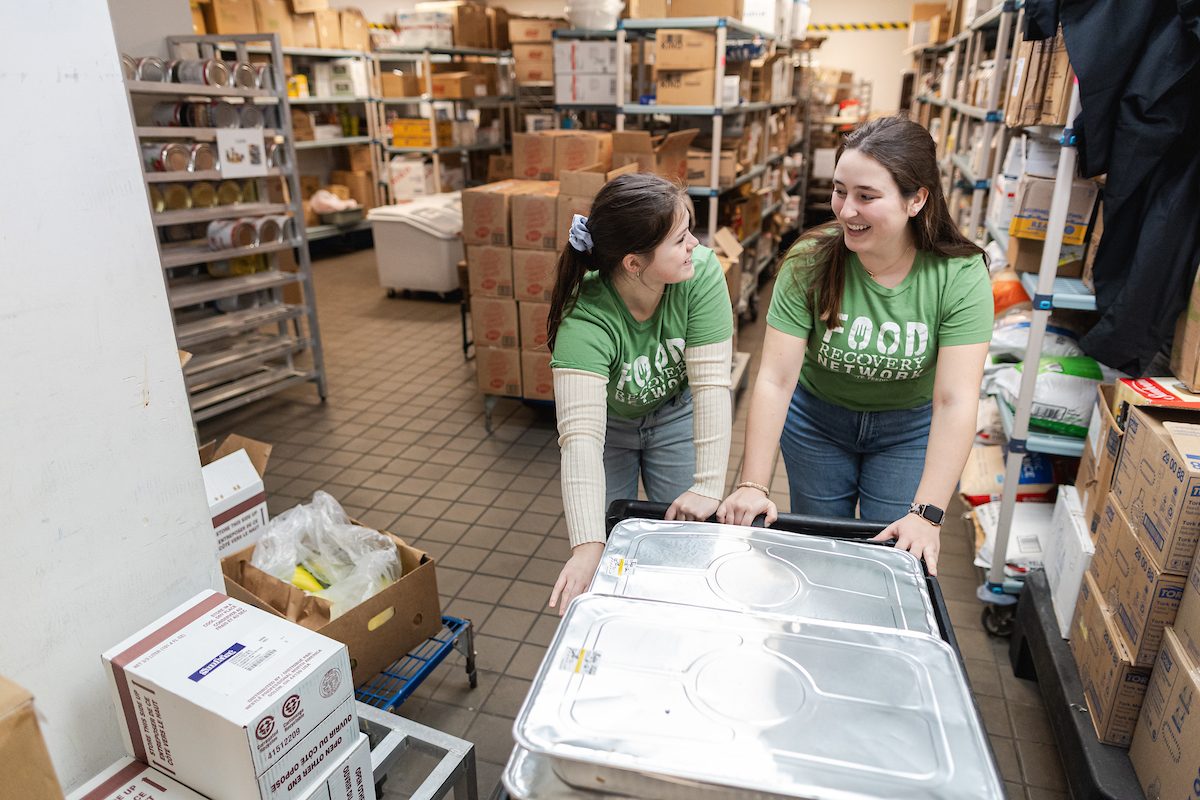The organizer: Loyola alum fights for the future of our planet
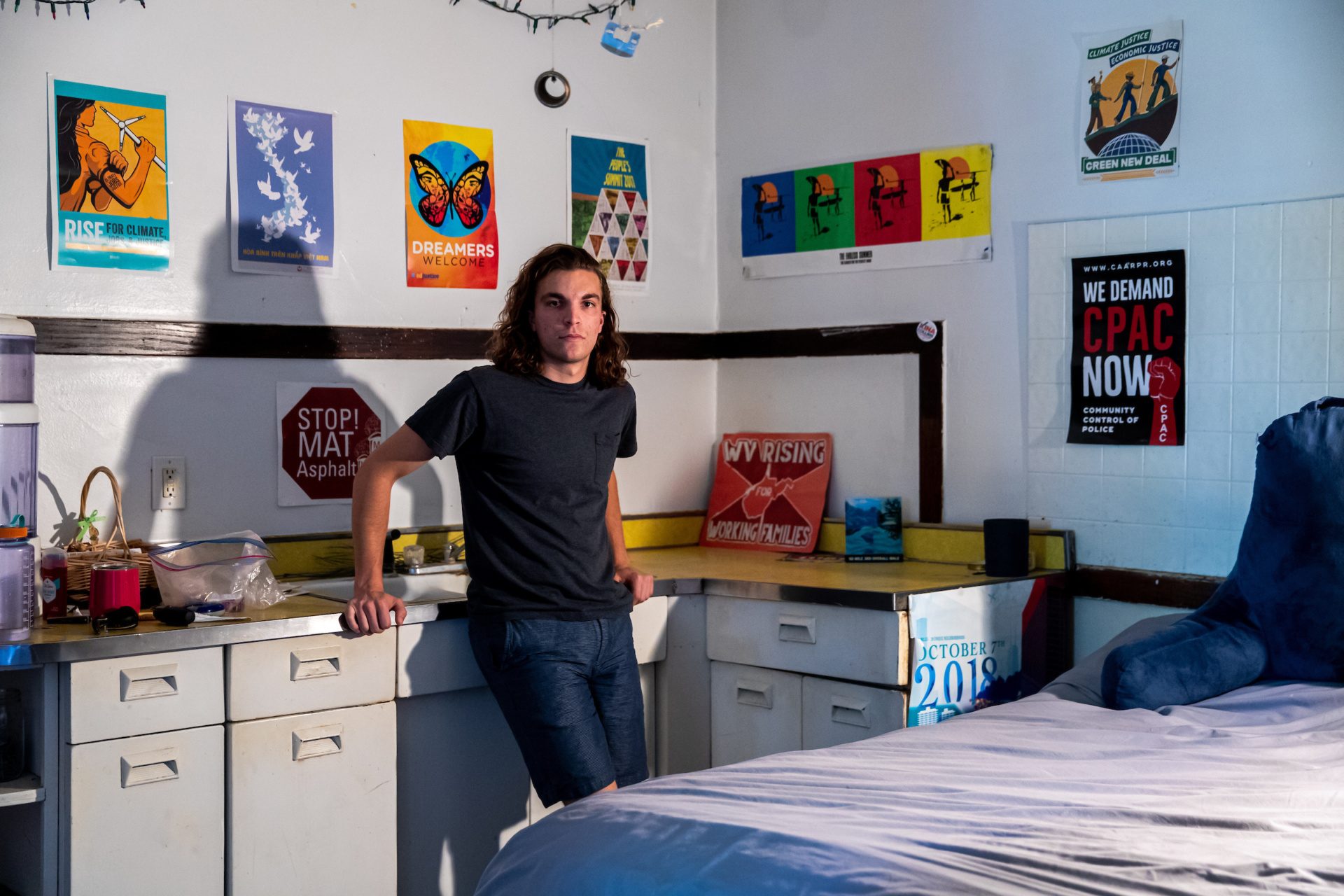
Around 8 a.m. on the morning of October 20, 2021, Loyola University Chicago alum Paul Campion entered Washington D.C.’s historic Lafayette Square, unfolded a red camping chair, and sat down. Four others from the Sunrise Movement—the national environmental advocacy organization in which Campion has been active since 2019—did the same. The oldest was 26 years old, the youngest one day past her 18th birthday. “Hunger Strike Day One” was written in chalk on the pavement in front of them. The sun was shining brightly, the fall colors peaking. Campion had not eaten breakfast that morning, a choice he did not make lightly. For the next 11 days, he wouldn’t eat anything at all.
The plans had come together rapidly. In the U.S. Senate, negotiations around President Joe Biden’s Build Back Better proposal were stalling out. Then appeared an article in the New York Times confirming that the White House, in an attempt to appease conservative Democrat Joe Manchin, was willing to strip from their package the centerpiece of Biden’s environmental agenda, a program to replace the nation’s remaining coal- and gas-fired power plants with clean alternatives.
Climate activists inside Campion’s circle were already exhausted and frustrated. The nation needed to overhaul its energy infrastructure, of this they were certain. Yet everything they’d been fighting for and organizing around—federal policies that grassroots Democrats nominally support—felt like it was slipping away. That Times story, published on a Friday, was the final straw. A 22-year-old Sunrise member from San Diego named Nikayla Jefferson put out the call: an indefinite hunger strike on the northern edge of the White House. Campion booked a cheap flight to D.C. for the following Monday.
“I was in awe. It was very inspiring. But it was also incredibly sad. My friends are putting their bodies and their lives on the line and it still isn’t enough. How do we actually win this thing?”
— Dejah Powell , Sunrise organizer in Chicago
Through people in the movement who’d participated in hunger strikes before, Campion cobbled together as much advice as he could. Find a doctor to manage your care with twice-daily health checks. Transition to a liquid diet 72 hours out, so the eventual calorie drop won’t feel so stark. Surround yourself with supporters who can buoy your spirits. Campion packed a Kairos cross he’d started carrying with him, a personal reassurance of God’s presence.
At the apartment that Sunrise rented in D.C., Campion woke up each morning, drank water, and brushed his teeth. (Volunteers had already tossed out leftover packets of ketchup and soy sauce, the most modest of temptations.) He’d park himself in Lafayette Square until dusk, at which point the strikers would retire to their Airbnb for planning sessions and rest. In between media interviews and confabs with lawmakers, there was plenty of downtime; Campion’s younger brother—a student at the Catholic University of America, four miles away—came by to play chess.
It felt uncomfortable almost immediately. A grinding sense of hunger set in and was soon replaced by heavy fatigue; when the body runs out of carbohydrates to burn, it enters a state of ketosis, breaking down fat and muscle for fuel. The doctor advised everyone to take electrolyte tablets and swap their camping gear for proper wheelchairs. The nearest bathroom was in a Starbucks two blocks away, and walking was becoming a hazard.
Four days in, one of the strikers blacked out while standing up from a couch and was rushed to the hospital. Campion huddled with his colleagues on a bed, sobbing. The physical risks were becoming less abstract. The atmosphere was heavy. Naturally thin, Campion started shedding a startling amount of weight. He was getting foggier, feeling dizzy, seeing spots. By the 10th day, his pulse had dropped dangerously into the 40s. Even wearing a winter cap and gloves indoors, he couldn’t stay warm.
After 11 days, Campion was sent to the hospital himself, out of concern for his heart. His mother, Kate, met him in the waiting room. Watching her son wither away had been excruciating—she’d lost her appetite and was struggling to sleep. The following morning, Campion made the difficult decision to end his strike. Even months after the fact, he still chokes up at the thought of it all. How stressful it was. How urgent the climate crisis has become. How small the window for meaningful action might be. How much is left to do.
But it also energized him. The Sunrise strikers had demonstrated moral clarity and had generated considerable attention. Campion is preternaturally optimistic, a prerequisite for the work he’s pursuing and the life he’s building. By November, he was back in Chicago, recovering and plotting next steps.
“I was in awe,” says Dejah Powell, a Sunrise organizer in Chicago and close collaborator of Campion’s. “It was very inspiring. But it was also incredibly sad. My friends are putting their bodies and their lives on the line and it still isn’t enough. How do we actually win this thing?”
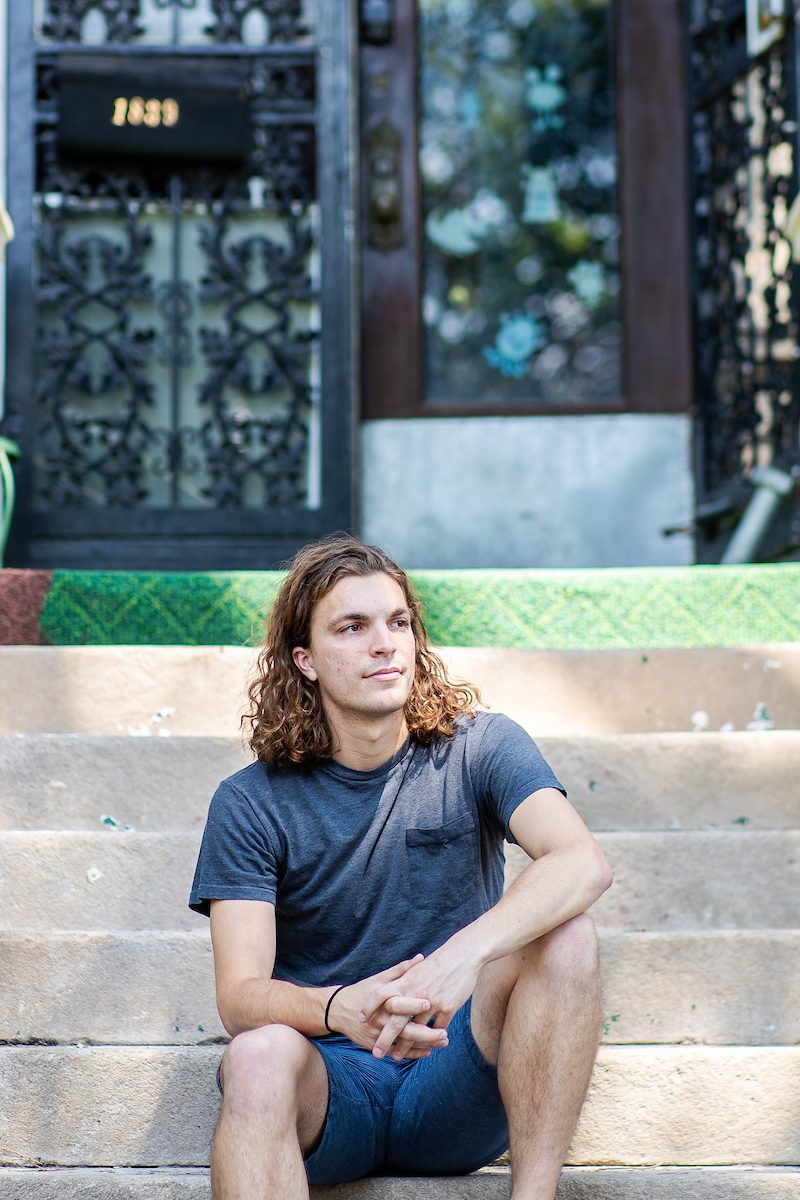
Campion’s parents, Kate and Dan, met in the Jesuit Volunteer Corps and settled in the D.C. suburb of Silver Spring, Maryland, where they raised five children. The family was tight-knit, with a productive garden in the backyard and boisterous nightly dinners. Paul was fourth in line—bright, active, and occasionally obstinate. At church, he served at the altar. At school, he worked hard but couldn’t always avoid the principal’s office.
The 2010s were a heady time to grow up in the shadow of Capitol Hill. Cramming onto the Mall for Barack Obama’s inauguration, in 2009, Campion remembers “this massive sense of hope and joy on so many people’s faces.” With his dad (a health care research manager), he helped retrofit the family home with green enhancements: an area to compost, rooftop solar panels, a geothermal heating and cooling system. And he dabbled in organizing as a student at Gonzaga College High School, setting up a film screening and a lobby day on behalf of comprehensive immigration reform.
Before Loyola approached him with a full scholarship offer, one he ultimately accepted, Campion considered taking a gap year to live on a farm or join Americorps. He connected with Catholicism’s left flank, drawing inspiration from the likes of Dorothy Day and Martin Luther King Jr., people rooted in their faith who nonetheless fought for liberation. “I was fired up about all the social justice stuff,” he says now. “I was like, I want to go live it! I want to go do it!”
He quickly found ways to scratch that itch in Rogers Park. During his first year on campus, Campion joined the Student Environmental Alliance (SEA) and spearheaded campaigns around campus fossil fuel divestment and onsite solar power generation. (He’d ultimately serve as SEA’s co-president.) Political action was both exciting and a prosocial avenue to channel his wariness of authority and natural exuberance. “I love people!” he says. “I really love getting to know who people are and what makes them tick. I love engaging with people about the big questions.”
The biggest question of all—can the planet survive?—drove his academic pursuits inside the School of Environmental Sustainability. Campion received the Ernest F. Hollings Undergraduate Scholarship from the National Oceanographic and Atmospheric Administration, which included a 10-week summer internship studying glacier recession in Alaska aboard a hydrological survey ship. During a semester abroad in Vietnam, he worked at the asset management firm Dragon Capital, piloting a project to use solar power to deliver clean water to communities in the Mekong Delta. Back in Chicago, he interned with the Environmental Law and Policy Center and won an Outstanding Student Conference Poster Award from the American Meteorological Society for his investigation of extreme precipitation patterns in the Midwest. Loyola eventually granted Campion a President’s Medallion. Ben Johnson, a professor of environmental history at Loyola, has heard “legendary things about Paul” from his fellow faculty.
As fascinating as environmental science was, Campion found it draining to be strapped to a desk or stuck in a lab. He wanted genuine connection. And the more he read about climate politics, the more convinced he became of the centrality of civic engagement. Economic and societal reform requires the accumulation of power. Organizing people was the best way, and possibly the only way, to overcome organized money. Tinkering around the edges was no longer sufficient.

American environmental activism, generously defined, dates back 130 years. It coincided with the rise of industrialization and urbanization; heavy manufacturing wore through natural resources at the same time that working people were relocating en masse to cities like Chicago, cutting themselves off from direct contact with the natural world. This new civilization was powerful and dynamic, but also destructive. It needed an ecologically-minded counterweight.
Johnson, Loyola’s environmental historian from the College of Arts and Sciences, identifies “two overlapping impulses” among the early U.S. conservationists. On one side were the technocrats, who believed those with specialized, scientific knowledge should make environmentally consequential decisions and regulations. On the other side were the romantics. They operated in the public realm, lobbying and writing and demonstrating. Moral pressure was their preferred tool. “At its most powerful,” Johnson says, “environmentalism has been a social movement as much as a push for legislation.” (His book, Escaping the Dark, Gray City: Fear and Hope in Progressive-Era Conservation, covers this period in detail.)
The Sunrise Movement is romantic, through and through. The organization was formed by veterans of college divestment campaigns in the spring of 2017, mere months after Donald Trump’s unexpected ascension. In choosing a name, the founders aimed for one that sounded radically hopeful—a little Barack Obama, a little Bernie Sanders. And they took cues from an influential academic paper by Harvard political scientist Theda Skocpol, Naming the Problem, which argued that environmentalists “need to orchestrate sustained political efforts that stretch far beyond friendly Congressional offices, comfy board rooms, and posh retreats.”
Members are disproportionately in their teens or 20s. The planet they’ve inherited is crumbling around them. To protect it necessitates something like a Green New Deal—a swath of green policies that would dramatically cut greenhouse gas emissions while simultaneously tackling questions of economic inequality and racial injustice, largely through massive federal investments in clean energy. Sunrise wants to reframe the climate crisis as a once-in-a-generation opportunity. And the best way to galvanize support for that type of decisive climate intervention, they’ve concluded, is through grassroots organizing and confrontation. The U.S. Civil Rights Movement is a beau idol.
In Morocco for the 2016 United Nations Climate Change Conference, as an extension of his Loyola coursework, Campion first met some of the folks who would eventually create Sunrise. He dug their vibe right away. Two years later, he watched in real-time as Sunrisers staged a dramatic occupation of House Speaker Nancy Pelosi’s office. They were accompanied by the newly elected congressperson Alexandria Ocasio-Cortez. She was 29-years-old, charismatic as hell, and spoke about the Green New Deal with convincing zeal.
That sit-in struck a nerve, attracting a deluge of volunteers and funding, along with the attention of Democratic politicians. (In the 2020 Democratic presidential primary, 20 of 26 candidates endorsed the Green New Deal.) Following along on social media, Campion remembers how much it moved him.
“This is it! This is the thing,” he remembers thinking. “Not just something that might, kind of help. And these young people are making it happen. Whatever my priorities are, I need to change them up.”
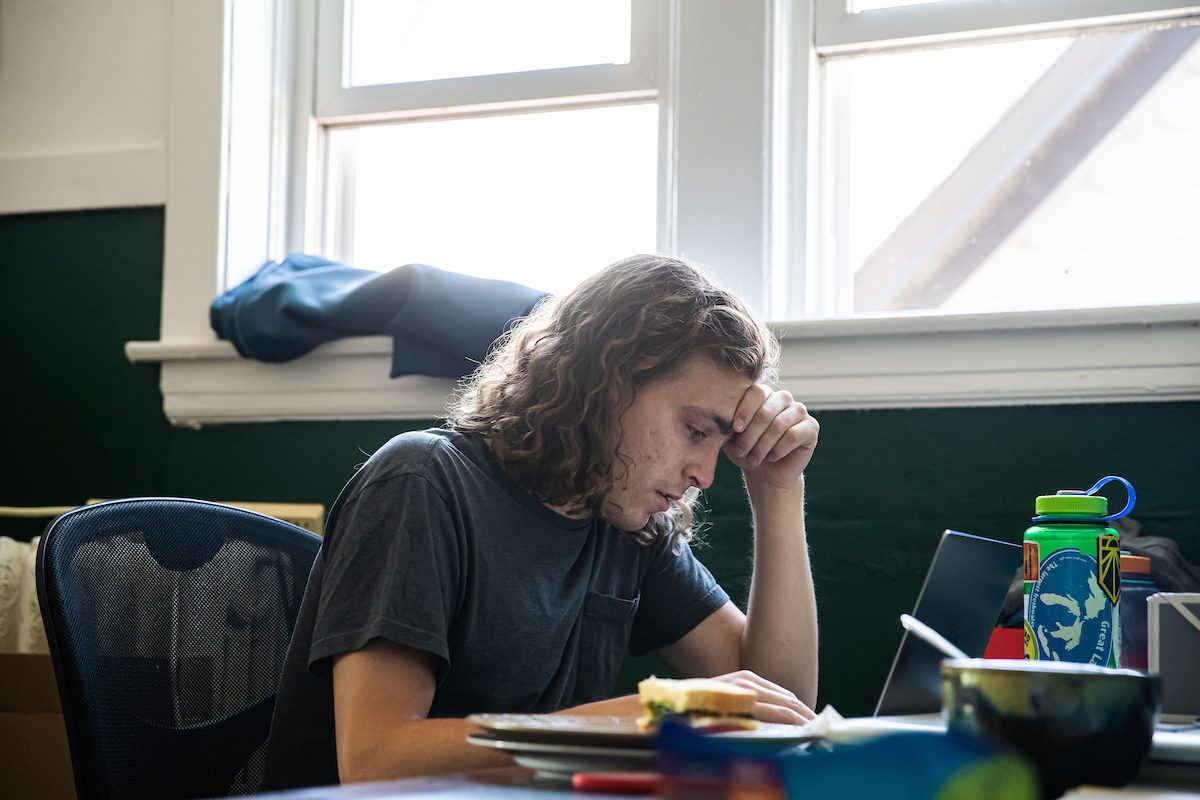
Within a year, Campion would launch Chicago’s Sunrise chapter (a hub, in the organization’s lingo), host a Green New Deal town hall meeting attended by 400 people, graduate from Loyola, and move to Washington D.C. on a six-month Sunrise fellowship. He’s still right in the thick of it, managing Sunrise’s distributed organizing initiatives as one of 60 full-time staffers. He describes his team’s approach as “meeting people where they’re at and welcoming them into the movement, helping them find their home and take action for the first time.” On his docket are organizing trainings, national phone banks for federally endorsed candidates, and weekly nationwide welcome calls. (His virtual calendar is color-coded to an anxiety-producing degree.)
He also throws himself into climate protests, like an April trip he made to West Virginia, where Sunrisers blocked the entrance to a coal plant from which Joe Manchin profits (to the tune of $500,000 annually). While out east, Campion heard stories from West Virginians who deal with coal runoff and boil warnings. He drove overnight and slept at an old camp ground. “Paul runs on some sort of unlimited battery. I would love to steal some of it,” says Powell, his Sunrise colleague. “He is always ready to do the thing.”
Back in 2019, Campion told a reporter that he didn’t have a five-year plan because climate change makes planning for the future challenging. It’s 2022, and he hasn’t adjusted course. “I find the work so exciting,” he says. “The world doesn’t have to be the way that it is. When we come together, we can transform it.”
Despite Sunrise’s emergence, the country in 2022 isn’t remarkably close to passing federal legislation on the scale required to stave off the most catastrophic impacts of a warming climate. While Republicans have largely abandoned their past climate denialism, the party’s platform downplays the danger of the crisis. Democratic margins on Capitol Hill, meanwhile, are slim, and might slip away entirely after the midterm elections later this year. Even if Democrats can hold onto congressional control, GOP filibusters in the Senate—a troublingly unrepresentative body—are nearly impossible to overcome. The fossil fuel industry still wields outsized power. Even Campion’s hunger strike couldn’t move the needle.
All the while, the dangers of climate change mount. A major scientific report produced by the United Nations this winter warns of more floods, heat waves, droughts, disease, starvation, and massive population dislocations. António Guterres, the United Nations secretary general, described it as “an atlas of human suffering.”
For the past year, Campion and Powell have served on a strategic planning committee tasked with reimagining how Sunrise might approach their task differently over the next half-decade. What if federal legislation is tabled? How can we protect the planet while accounting for the shifting political landscape? Sunrise members will ratify new organizational “DNA” later this summer. Call it Sunrise 2.0.
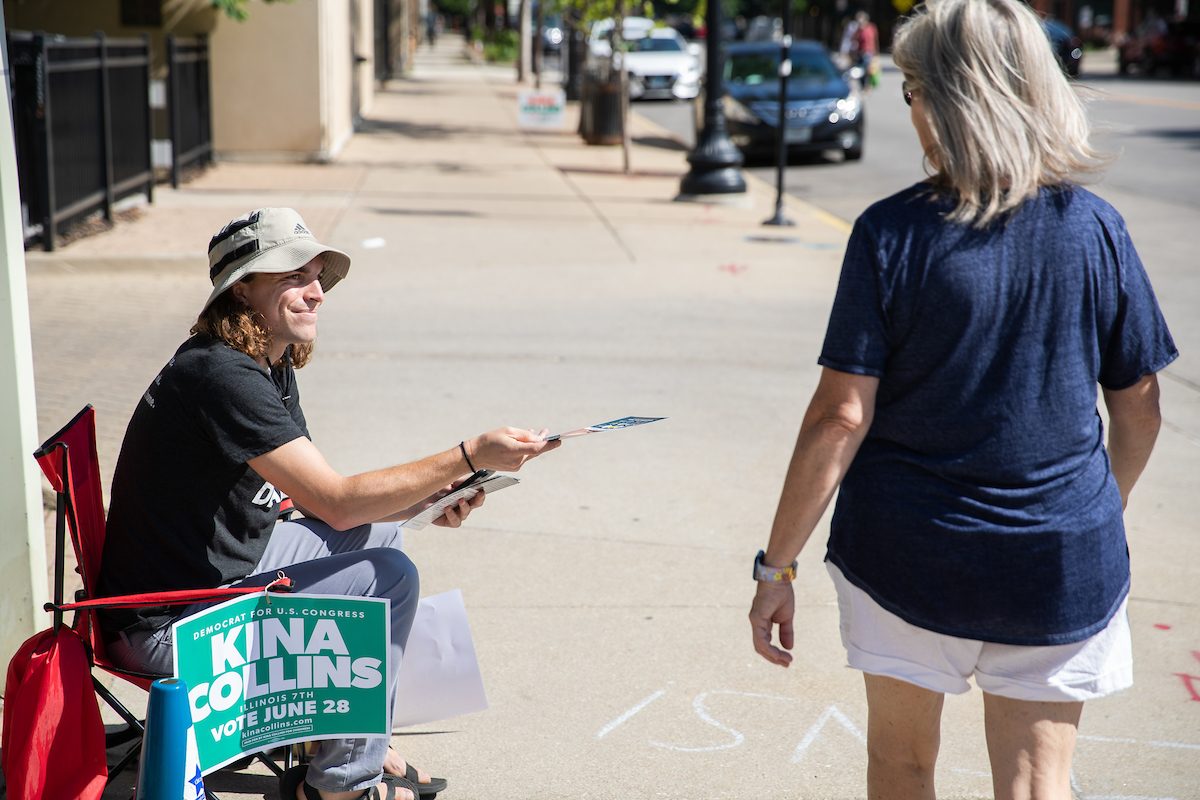
All that soul-searching is pointing in the direction of the local. Sunrise’s chapters are hunting for alternatives to federal action, pushing climate policy at the city or regional level. They’re also doubling-down on their efforts to elect politicians who share their environmental exigency. In Chicago, the hub that Campion founded endorsed two congressional candidates—Kina Collins in Illinois’s 7th District and Delia Ramirez in Illinois’s 3rd District. Both are progressive Democrats who ran in their party’s primary at the end of June. (Collins narrowly lost. Ramirez won.)
One rainy Saturday in May, Campion bikes over to the public library branch in Logan Square, on the Northwest Side, for a canvassing meet-up on behalf of Ramirez. Despite the dreary weather, he has a buzz about him. He’d spent the past week campaigning in Pittsburgh on behalf of another Sunrise endorsee, Summer Lee, who won her primary by a mere 740 votes. Campion and his team there made 20,000 phone calls and blitzed a few thousand homes in the lead-up; their efforts all but carried the 34-year-old state legislator over the finish line. Ramirez—an accomplished state legislator herself and the daughter of Guatemalan immigrants—was next in line.
A dozen 20-somethings form a circle in the library’s community room to make introductions and run through some canvassing pointers. Campion blends into the crowd. Since graduating from Loyola, he’s settled into a certain type of activist aesthetic: runner’s build, strong jaw, brown hair that now reaches his shoulders. He’s serious but chill, earnest yet occasionally sarcastic. When something really tickles him, he lets rip a honk of a laugh. His feet are never far from a pair of Teva sandals.
Sunrise aims to make canvassing feel like a calling. (During introductions, one attendee admits that she “comes for the actions and stays for the hangs.”) Emily Isaacson, who is leading the effort, centers everyone with a breathing exercise. They sing a Dolly Parton protest song, pass out Sunrise stickers, and walk through Ramirez’s policy priorities. Campion has a “sneaky suspicion that people don’t know how cool Delia is.” Before they hit the streets, he insists the canvassers take a group photo, commemorating the event. He stands in the back row, cheesing, his arms stretched to the ceiling.
From the library branch, Campion sets out down Fullerton Avenue and turns south onto Sawyer Avenue. His virtual list has 92 addresses, prospective Democratic households situated within the newly redrawn district boundaries. Canvassing is anything but a chore for him—if he can prompt even one engaging conversation in the early going, he knows it’ll be a satisfying session. (Isaackson jokes that Campion has “puppy dog, golden retriever energy.”)
It’s also not his first rodeo. He’s practiced on the doors, slick even. He knows how to keep a conversation going and when to drop one that’s fizzling. He likes to carry with him a clipboard, which lends an aura of authority. And he’s learned that homes with smart doorbell cameras are usually dead-ends.
At locked apartment gates, Campion leaves behind campaign literature. To one resident he rattles off all the reasons to support Ramirez—her rejection of corporate donations, her track record on affordable housing, her backing of the Green New Deal. The woman seems interested, readily grabbing a pamphlet. Her small son, curious about their visitor, sidles up to her leg. Campion smiles widely and thanks them both for their time. In his tracking app, he marks down his new prospect.
On his way out of the library, Campion had wolfed down a Girl Scout cookie, hoping for an afternoon sugar kick. Only after he’d grabbed the cookie from the sleeve did he realize it was marked with an inspirational slogan: “I am strong.”
“The world doesn’t have to be the way that it is. When we come together, we can transform it.”
— Paul Campion , Loyola University Chicago
A few months before the COVID-19 pandemic, and with his six-month Sunrise housing fellowship winding down, Campion moved out of his D.C. apartment and into Emmaus House, a Catholic Worker community in North Lawndale, on Chicago’s West Side. It sits on a quiet stretch of two- and three-flats, a simple stone house around the corner from the green oasis that is Douglass Park. Ten people live inside at the moment, in atypical configurations. Campion sleeps in a converted kitchen, using a fading yellow countertop (with decommissioned sink) as a makeshift nightstand. Mice occasionally skitter through, uninvited.
“We’re a full house right now, for sure,” Campion says, diplomatically, one spring morning. He’s wearing a Green New Deal t-shirt, a uniform of sorts, and his phone keeps pinging—the expanding collective had just purchased a second property, seven houses up, and needed to square away their financing.
Lydia Wong is one of Campion’s roommates and a co-founder of Emmaus House, which opened its doors in 2012. For folks experiencing some form of housing insecurity, it’s a house of hospitality. For folks like Wong (a clinical social worker) and Campion, it provides an opportunity to live simply and intentionally in Chicago, following in the century-long social justice lineage of the Catholic Worker Movement. Community dinner is on Tuesday night. Mutual aid distribution is on Saturday. Nurses and artists and cooks all share bathrooms and music and chores. They tend to the garden across the way and mow vacant lots the city ignores. They love their sea-foam green tub and their building’s original wood detailing. Campion “brings that extrovert energy,” according to Wong. He’s trying to cut down on his whistling.
Campion’s lifestyle is not for everyone, to put it lightly. Despite its rich organizing tradition, North Lawndale remains segregated and occasionally violent. Emmaus House has plenty to recommend, but nobody would characterize it as luxurious. He’s a long way from Silver Spring, spatially and tonally.
But he’s not naive, either. Campion is living his life with maximum purpose. He’s building relationships across difference. He’s showing up, with gratitude and an open mind. He’s not performing. The common good—and society’s future—is paramount.
After a tour through Emmaus House, Campion hobbles down the front stoop to the sidewalk. (A serious runner, he’d tweaked a muscle in his leg earlier that morning.) A “Kina Collins for Congress” lawn sign hangs in the second-story window. More Zoom calls await.
At the end of the block, some utility workers are drilling into the pavement, making a racket. Campion glances over, shakes his head: “Why are we replacing gas lines instead of electrifying every home!?”
He makes the comment not with fury but with an incredulous chuckle. The drilling continues. He closes his gate, climbs the stairs, and gets back to work.
Read more stories from the School of Environmental Sustainability.
